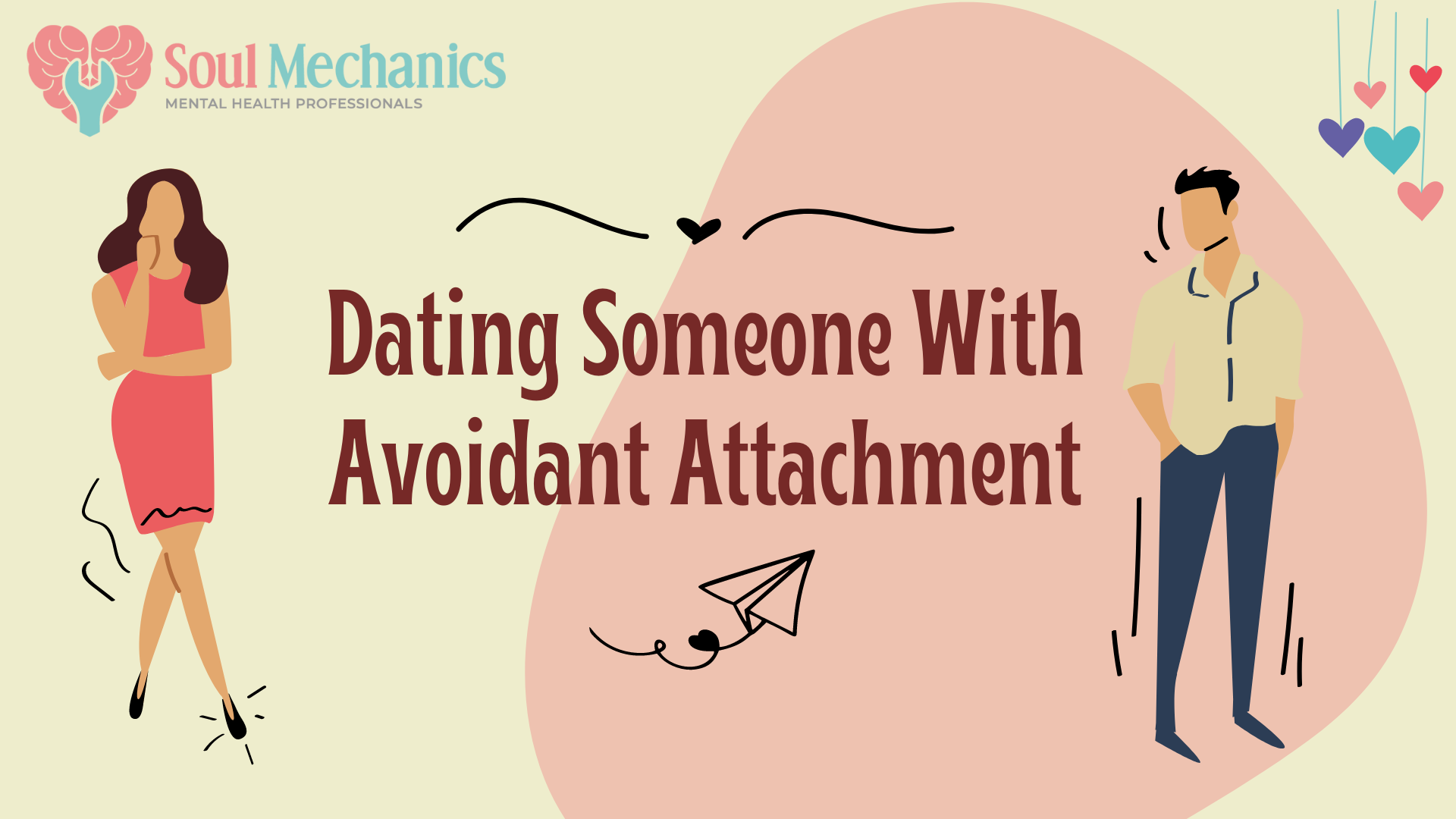Attachment Styles: Dating Someone With Avoidant Attachment
Attachment Styles: Dating Someone With Avoidant Attachment

Written By: Kelly Chan Jia Li, Clinical Psychologist (MAHPC(CP)00353)
Love is often a complex and beautiful journey that leads us to explore the depths of our emotions. When it comes to relationships, attachment styles play a crucial role in shaping how we connect with our partners. One such attachment style is avoidant attachment, which can present unique challenges in a romantic relationship. In this article, we will take a closer look at what it means to date someone with avoidant attachment, exploring the characteristics, potential struggles, and strategies for building a healthy and fulfilling connection.
Understanding Avoidant Attachment
Attachment styles, rooted in early childhood experiences, influence how individuals approach intimacy and emotional bonds. Avoidant attachment is one of the four primary attachment styles identified in psychology, alongside secure, anxious-preoccupied, and disorganised attachment. Avoidant attachment often stems from inconsistent caregiving during childhood, leading individuals to develop a preference for independence and self-sufficiency. Individuals with avoidant attachment have difficulty relying on others and may actively create distance from caregivers or attachment figures.
They also often struggle with forming deep emotional connections and may prioritise independence over intimacy. This attachment style may have led them to develop the belief that relying on others is unreliable or unsafe. As a result, avoidant individuals may find it challenging to trust and depend on others, which can impact their overall well-being and interpersonal interactions.

Reminder: If you or your loved one are struggling with avoidant attachment issues, please do not hesitate to reach out to us at Soul Mechanics KD or Soul Mechanics Ipoh. Remember, seeking help is not a sign of weakness but strength!
Characteristics of Avoidant Attachment
Difficulty with Intimacy
An avoidant partner will find it challenging and hesitant to share their feelings with their respective partners. They might even find it hard to open up about their days, let alone discuss deeper emotions. Individuals with avoidant attachment may find it challenging to open up emotionally. They may also resist becoming too emotionally invested in a relationship. They may keep a certain emotional distance to protect themselves from potential emotional pain.
Fear of Dependency
An avoidant partner may have fears of relying too much on their partners. Even if their partners are supportive and caring, avoidant partners might struggle to ask for help or share their vulnerabilities. They may view vulnerability as a weakness and avoid relying on their partners for comfort. This fear of dependency can lead to her keeping certain aspects of her life separate, maintaining a degree of emotional independence.
Tendency to Withdraw
When an avoidant partner is faced with emotional intensity or conflict, they may withdraw or become emotionally distant instead of engaging in open communication. They may need time alone to process their emotions. This withdrawal can create a sense of rejection for their partners, leading to further misunderstandings and frustration.

Independence and Self-Reliance
Someone with avoidant attachment values their independence and autonomy highly. They will prioritise their personal space and individual pursuits, sometimes at the expense of nurturing the emotional bonds with their partners.
Challenges in a Relationship with Avoidant Attachment
Communication Barriers
Dating someone with avoidant attachment often involves navigating communication challenges. The avoidant partner may struggle to express their needs or emotions openly. The avoidance of emotional expression may lead to misunderstandings and feelings of neglect.
Emotional Rollercoaster for the Partner
Dating someone with avoidant attachment can be emotionally demanding for the partner. One day, the avoidant partner might be fully engaged, and the next day, they can become highly distant. The fluctuating emotional availability of the avoidant individual may leave their partner feeling insecure or unimportant.

Constant Reassurance and Validation from the Partner
Someone who is dating a partner with an avoidant attachment may find themselves constantly seeking reassurance and validation from their partner. Imagine constantly seeking reassurance from their partner with avoidant attachment, asking questions like “Do you really love me?”. This constant need for validation can create tension and frustration in the relationship, leading to a cycle of insecurity and withdrawal, making it difficult for both individuals to establish a sense of trust and intimacy.
Strategies for Thriving in a Relationship with Avoidant Attachment
Understanding What Avoidant Attachment Is
It is important to educate yourself about avoidant attachment and the behaviours associated with it. This will help you better comprehend their emotional needs and reactions in relationships. You can approach the relationship with empathy and patience by understanding their attachment style.
Foster Open Communication
Encourage open and honest communication within the relationship by creating a safe space where both partners can express their needs, fears, and desires without judgment. Patience and understanding are vital in expressing themselves to strengthen the relationship bond over time.

Respect Autonomy
It is important to respect avoidant partner’s need for alone time and give them the space to recharge and process their emotions. Do give them the space they require without feeling rejected. Building trust involves acknowledging and honouring each other’s individuality. This can help them feel more comfortable and secure in the relationship, knowing their boundaries are being respected.
Build Trust Gradually
Rome was not built in a day, similar to trust. Trust cannot be built overnight, especially when your partner has an avoidant attachment. It is crucial to be patient and understanding, as this can allow your avoidant partner to feel secure in the relationship over time. For example, you may encourage them to communicate their fears or concerns and be patient and understanding when they struggle with vulnerability. As trust grows, your partner may become more comfortable with vulnerability.
Establish Healthy Boundaries
You can work with your partner to set clear and healthy boundaries within the relationship. This includes respecting each other’s personal space and understanding the balance between independence and togetherness. This can help create a supportive environment where both partners feel secure.
Seek Mental Health Professional Support
Consider couples counselling or individual therapy to gain insights into your relationship dynamics. A mental health professional can provide guidance in understanding and addressing underlying issues to strengthen your connection.
If you feel that you are experiencing difficulties with the journey of your relationship with your partner, feel free to reach out to our Kota Damansara and Ipoh branch for further information. Seeking assistance can be the first stepping stone towards healing.
In a Nutshell
Dating someone with avoidant attachment requires understanding, patience, and effective communication. Recognising the unique characteristics of avoidant attachment and implementing strategies to address potential challenges can contribute to a healthier and more resilient partnership. Love, when nurtured with empathy and care, has the power to overcome the hurdles posed by different attachment styles, ultimately leading to a more profound and lasting connection. Remember, understanding and respecting your partner's attachment style can lead to more compassionate and successful relationships.
If you enjoyed reading this, why not broaden the horizon of knowledge by learning about "Emotionally Unavailable Men: The Pursuit of the Unreachable"?
You can read the blog here.
For more content related to mental health do follow us on our official Instagram.


Comment (1)
thanks for info.